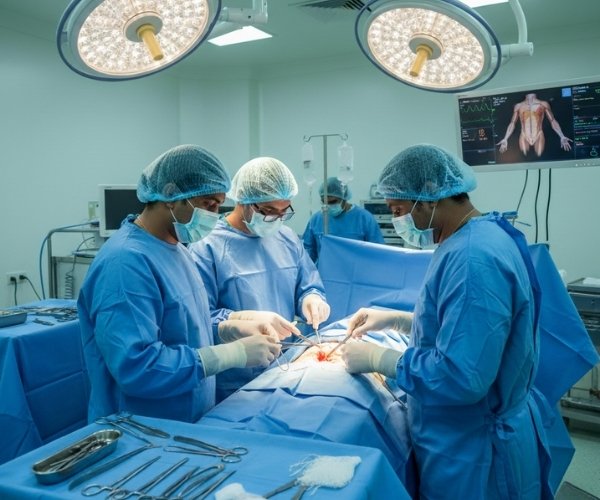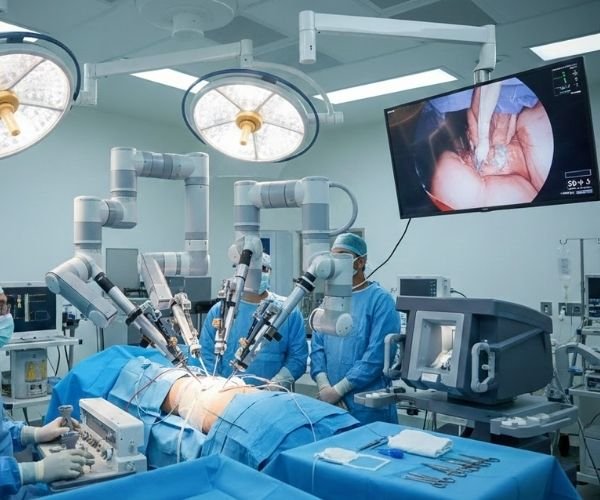- Phone : +91-9691481578
- Email : drachalagrawal@gmail.com
- Opening Hours : 10:00am to 07:00pm
Home > Other Hernia > Femoral Hernias Surgery
Request a Callback
Femoral hernia typically appears as a bulge at the top of the inner thigh or groin and is more prevalent in women. A femoral hernia may cause pain and could lead to complications if left untreated. Dr. Achal Agrawal in Indore provides exceptional surgery for hernia, including femoral hernia. All procedures are tailored to your needs, done safely and under anaesthesia. You will be able to recover as quickly as possible following your surgery and have long-term relief from the discomfort that has been recurring.
A hernia of this kind, known as a femoral hernia, develops in the groyne region, more specifically in the femoral canal. The inguinal ligament, a strip of tissue that connects the hip bone to the pubic bone, is a small opening called the femoral canal.
When a weak spot or opening in the muscle or fascia around an organ or tissue, a hernia results. A small portion of the intestine or other abdominal tissue may push through the femoral canal, which is found in the groyne right below the inguinal ligament, in the event of a femoral hernia.
Femoral hernias are more common in women than in males, and they frequently occur as a result of weak groyne muscles or tissue. The groyne area may protrude, there may be pain or discomfort, and there may be nausea or vomiting as femoral hernia symptoms. It is crucial to see a doctor for a diagnosis and treatment if you think you may have a femoral hernia.

Femoral hernias happen when an organ or piece of tissue pushes through a tear or opening in the muscle or fascia of the area around the groyne. The following are some of the most typical femoral hernia causes:
Congenital weakness: Some people have a weak region in the femoral canal or the surrounding muscles or fascia from birth, which increases the chance of developing a hernia in the future.
Pregnancy: The muscles in the groyne area may weaken as a result of the increased strain on the abdominal wall during pregnancy, which raises the possibility of a femoral hernia.
Obesity: When the extra weight puts strain on the abdominal wall and groyne region, those who are overweight or obese are more susceptible to develop a femoral hernia.
Chronic coughing: Conditions such as chronic obstructive pulmonary disease (COPD) or chronic bronchitis that cause persistent coughing can put pressure on the abdominal wall and increase the risk of a femoral hernia.
Previous surgery: Scar tissue from previous surgeries in the abdominal area can weaken the muscles and increase the risk of a hernia.
Physical activity: Activities that involve heavy lifting, straining, or pushing can put pressure on the abdominal muscles and increase the risk of a hernia.
Here are some of the most typical femoral hernia indications and symptoms, however they might vary from person to person.
Treatment for a femoral hernia usually involves surgery, as this provides the most effective way to fix the hernia and prevent additional problems. The type of surgery used will depend on factors such as the size of the hernia, the severity of symptoms, and the general health of the patient. Patients having Femoral Hernia Surgery in Indore may benefit from advanced and minimally invasive techniques meant for quicker recovery and better outcomes. The standard types of surgery include:

Laparoscopic Hernia Surgery in Indore provides minimally invasive treatment with smaller cuts, less pain, quicker recovery, and expert surgeons ensuring safe.

Robotic Surgery for Hernia in Indore offers advanced, precise, and minimally invasive hernia repair with faster healing, minimal pain, and improved surgical accuracy for better outcomes.
The Amazing Steps of our Treatment
1
Book your Appointment
2
In Person Counselling
3
Weekly Followup

Get in Touch